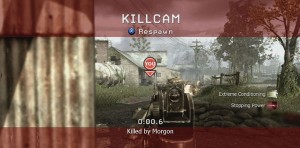Reflecting on gameplay
I lose a lot of games. In fact, on balance I almost certainly lose more times than I win. But I’m not going to let it get me down. Repeated failure in games demonstrates a number of important aspects of in-game learning. The fact that getting it wrong, often terminally, is an intrinsic part of gameplay and yet doesn’t discourage us from having another go clearly illustrates the effective scaffolding of the system. Each failure is supported by a series of devices to improve the player’s performance. If the designers have done their jobs well then the challenge is tough but not too tough.
Games promote reflection in a number of ways:
- Delay
- Replay
- Parley (please forgive the pretentiousness of the rhyming!)
When we lose or die in a game, we’re not instantly catapulted back to moment just before the end. Instead there’s a delay and some form of resetting to a previous ‘checkpoint.’ We see it in the respawning during first-person shooters like Left 4 Dead, the restarting of levels in games like Angry Birds and return to the starting grid in the likes of Forza. Although it’s largely the consequence of technical issues (the need to reload all the appropriate data), it gives us just enough time to curse our misfortune, consider what went wrong and prepare ourselves for another go. It’s part punishment, part breathing space.
In games like Call of Duty we have the pleasure of watching our own death from our assassin’s point of view. The killcam is a bit disconcerting. Still, it reveals some interesting information about our demise – where we were killed from, the type of weapon, whether or not we wounded our assailant. It’s all valuable feedback about our performance and inevitably encourages us to think about how we might minimise the chance of it happening again and how we might deploy those same tactics offensively. Just as in sports television, racing and football games have long used action replays to show what’s just happened. It’s not simply gratuitous eye-candy: it’s a lesson in the winning strategy.
The final form of in-game reflection comes through a dialogue of sorts: a combination of multiplayer chat and system feedback. It is easy to be given (at times fairly blunt) feedback to improve our performance from team mates during a game, non-player characters too. Similarly, the game itself often provides prompts for reflection through hints and tips at the end of each ‘life.’ It is a conversation that starts with our performance and concludes with the game’s response. These prompts help us to frame our thinking and ultimately support our progress.
Of course there are many other forms of feedback that describe performance but they don’t necessarily encourage reflection, rather they simply describe the current state of play and progress to date. That’s not to say it’s not valuable but it serves another purpose – encouragement. More on that another time.

